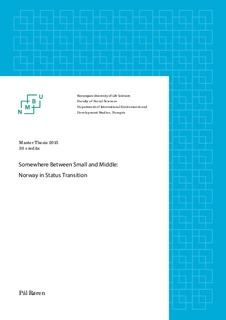| dc.description.abstract | Norway's status is puzzling. Traditionally, Norway has been conceived of as a small power with limited foreign policy alternatives at its disposal due to the constraints of the international system. However, Norway's newfound wealth coupled with its explicit focus and leading figure in multilateral cooperation, diplomacy, international law and peace promotion suggest that Norway is something more than a small power. This thesis applies a modified neoclassical realist framework for conceptualising and analysing status and middle powers. This approach emphasises both the materiality and social aspects of status. It seeks to overcome the bias’ that arise from drawing on a singular approach laden with researchers pre-conceptions, this study triangulates the alternative methods measures to pioneer a more rigorous and balanced metric of status measures than has been used before in the status and middle power literature. The thesis shows that Norway's material capabilities, operationalised as hierarchical status resources, have risen significantly the last 40 years, but fail to reach the levels of established middle powers such as Canada and Australia. Norway's behaviour, operationalised as moral authority output, is either larger or equal to that of the established middle powers. Measuring the level of international recognition, however, the thesis shows that despite the increase in hierarchical status resources and consistently high moral authority output, Norway's standing in the international system is actually decreasing. This discrepancy is puzzling given the strong empirical and theoretical link between material capabilities and behaviour on the one hand and status on the other. The thesis suggests that Norway's recognition discrepancy stems from three potential sources: (1)Norway's foreign policy does not stand out compared to the other 'like-minded' countries Canada, Denmark, the Netherlands and Sweden; (2) Recognition is likely to follow a regional pattern, suggesting that states will recognise countries that they perceive are regionally dominant; (3) Recognition and status attribution tend to lag behind the actual hierarchical status resources and moral authority output, suggesting that Norway's low recognition is a direct consequence of low historical standing. | nb_NO |

